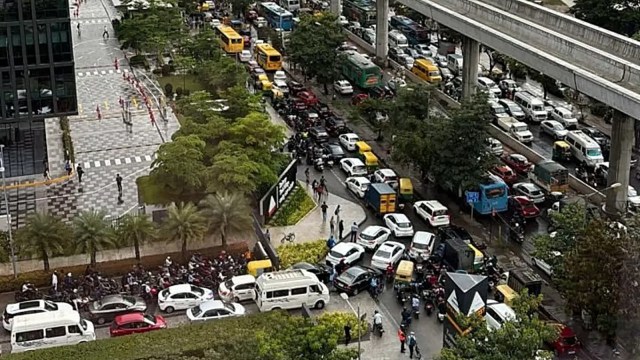10 km in over 34 minutes: after Barranquilla and Kolkata, Bengaluru has slowest traffic in the world, says TomTom report
Bengaluru’s traffic crisis is fuelled by a surge in private vehicles, with over 2.5 million cars on its roads—more than in New Delhi.
 Bengaluru’s traffic crisis is fuelled by a surge in private vehicles, with over 2.5 million cars on its roads—more than in New Delhi. (File)
Bengaluru’s traffic crisis is fuelled by a surge in private vehicles, with over 2.5 million cars on its roads—more than in New Delhi. (File)The infamous traffic congestion in the IT capital of India has again hit the headlines as the TomTom Traffic Index has found that Bengaluru has the third-slowest traffic in the world.
According to the 2024 TomTom Traffic Index, the average time to travel 10 km in Bengaluru is 34 minutes and 10 seconds, a rise of 50 seconds from 2023.
Bengaluru trails only Barranquilla in Colombia, where the same distance takes 36 minutes and six seconds, and Kolkata, at 34 minutes and 33 seconds. At 33 minutes and 27 seconds, Pune ranks fourth globally, underscoring India’s growing urban traffic issues.
Other Indian cities on the index are Hyderabad (18, travel time 32 minutes), Chennai (rank 31, travel time 30 minutes), Mumbai (rank 39, travel time 29 minutes), Ahmedabad (rank 43, travel time 29 minutes), Ernakulam (rank 50, travel time 29 minutes), Jaipur (rank 50, travel time 28 minutes), and New Delhi (rank 122, 23 minutes).
Despite being overtaken by Kolkata, Bengaluru remains a close second. In 2022, it was ranked the world’s second slowest city, with an average speed of just 18 kmph over a 10-km stretch, making it the slowest in India that year. Cities such as London, Milan, and Toronto also face similar challenges, highlighting the global nature of urban traffic congestion.
Bengaluru’s traffic crisis is fuelled by a surge in private vehicles, with over 2.5 million cars on its roads—more than in New Delhi. Daily vehicle registrations add another 2,000 vehicles, further straining its infrastructure.
On its website, the TomTom Traffic Index says it relies on floating car data to rank cities. A representative sample of this data, encompassing 737 billion km, is used to analyse how traffic patterns changed worldwide throughout the past year.
Several factors, such as road infrastructure, speed limits, congestion, and weather, influence travel times.












